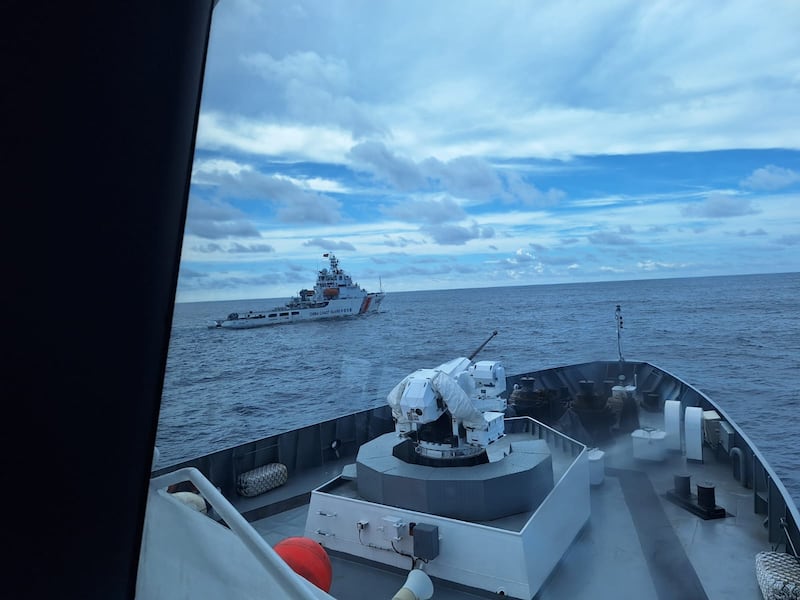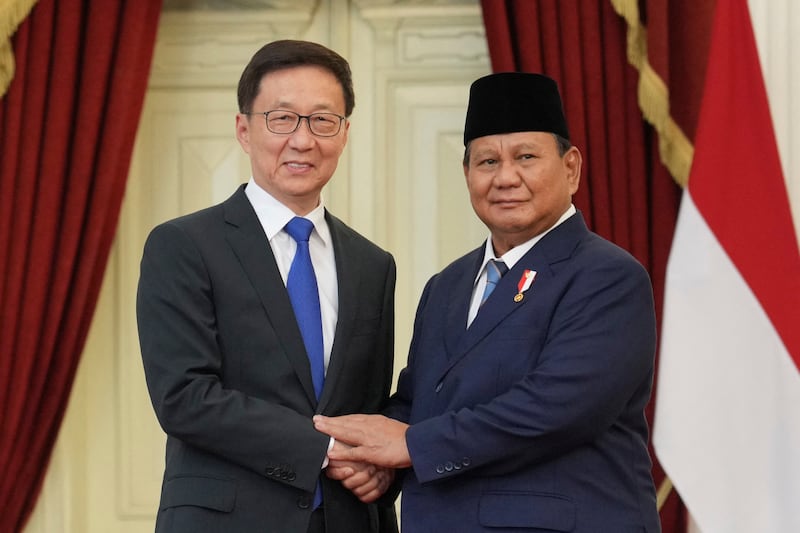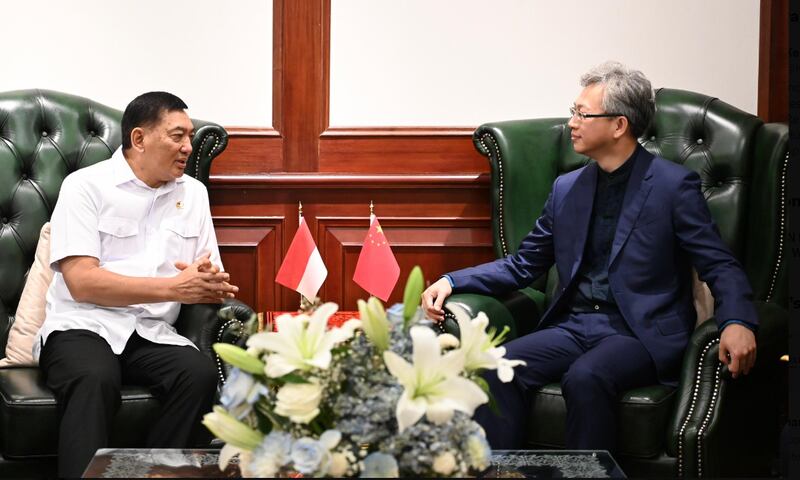JAKARTA, Indonesia — Jakarta’s feisty response last week to the Chinese coast guard “disrupting” Indonesian survey activities in the North Natuna Sea appears to show that new President Prabowo Subianto has shed his “cuddly grandpa” election persona in favor of his familiar disposition as a ex-general, analysts said.
On three occasions during the first week of Prabowo’s presidency, Indonesian coast guard and navy ships chased and expelled the Chinese vessel from South China Sea waters in Jakarta’s exclusive economic zone, which Beijing said was “under the jurisdiction of China.”
The measures taken by Indonesia were calculated, according to Arie Afriansyah, an expert in international maritime law at the University of Indonesia.
“The actions are a positive sign, not only sending a message to the Indonesian people but also to the international community that the Natuna Sea is now being guarded more closely,” Arie told BenarNews, an RFA-affiliated online news organization.
“I believe the maneuvers of the China Coast Guard are part of a strategy to test the waters and see if the new government under Prabowo is lenient.”
RELATED STORIES
Vietnam builds airstrip on reclaimed island in South China Sea
Increased risk of conflict in South China Sea, forum warns
Ignoring the risks, Vietnamese leave home in droves
Muhammad Waffaa Kharisma, an international relations researcher, concurred.
“Prabowo’s preference is to be more assertive in protecting assets and upholding sovereignty,” said Waffaa, from the Centre for Strategic and International Studies (CSIS) in Jakarta.
“However, this should be balanced with good neighborly diplomacy. It remains to be seen how this will play out.”

‘Clear demonstration’
The Indonesian coast guard (Bakamla) said that when a China Coast Guard ship identified itself over radio as patrolling “in Chinese waters,” it responded by affirming Indonesia’s sovereign rights under the U.N. Convention on the Law of the Sea (UNCLOS).
China Coast Guard ship 5402 “disrupted the Arwana 3D Seismic Data Survey and Processing activities being carried out by PT Pertamina East Natuna using the MV Geo Coral ship,” Bakamla said in a weekend statement about the Oct. 21 incident involving a vessel from the Indonesian state-owned oil firm.
Two Indonesian Navy patrol ships and a Bakamla air patrol aircraft “carried out shadowing and succeeded in driving the CCG 5402 ship out of Indonesia’s jurisdiction in the North Natuna Sea,” it added.
“Bakamla’s expulsion of the Chinese Coast Guard vessel from the North Natuna Sea’s continental shelf is a clear demonstration of our commitment to safeguarding our maritime domain,” Bakamla said.
Lin Jian, a spokesperson for China’s foreign ministry, said the CCG vessel’s operations were legitimate and within Chinese jurisdiction.
“China stands ready to enhance communication and consultation with Indonesia through diplomatic channels and properly handle maritime issues between the two countries,” he said during a daily press conference Oct. 24.

Indonesian presidential spokesman Hasan Nasbi and the foreign ministry declined to comment about the three Chinese encroachments, the first of which occurred a day after Prabowo met with Chinese Vice President Han Zheng on Oct. 20.
Han was in Jakarta to attend Prabowo’s inauguration.
However, mid-week, Indonesia’s new Defense Minister Sjafrie Sjamsoeddin had what appeared to be a cordial meeting with Chinese Ambassador Wang Lutong, who paid him a courtesy call.
“In the meeting, the two hope[d] to create new opportunities in bilateral relations that are not only limited to defense cooperation, but also to increasing the stability and prosperity of the region,” the ministry said via X.
“In addition, the Minister of Defense also expressed his desire to continue to increase cooperation in the defense sector, in the form of joint exercises between Indonesia and China.”
Geopolitical flashpoint
The South China Sea, one of the world’s busiest maritime regions, has long been a geopolitical flashpoint, with China claiming much of the sea that overlaps with territories claimed by Vietnam, the Philippines, Malaysia, and Brunei.
Although Indonesia does not consider itself a claimant in the territorial dispute, Beijing’s maritime assertions often infringe upon Indonesia’s EEZ in the North Natuna Sea.
In 2016, the Permanent Court of Arbitration in The Hague said China’s claims had no legal basis, a decision Beijing has rejected.

Under President Joko “Jokowi” Widodo (2014-24), similar confrontations with Chinese coast guard ships were not uncommon.
However, Prabowo’s background as a military leader has led some to expect a firmer stance from his administration, said Khairul Fahmi, an analyst at the Institute of Strategic and Security Studies.
The incident in the Natuna Sea may align Indonesia more closely with Southeast Asian neighbors such as the Philippines and Vietnam advocating for a rules-based order in the waterway, he added.
“I believe the Prabowo administration is demonstrating a more assertive stance towards maritime sovereignty issues, especially in the Natuna Sea,” Khairul told BenarNews.
For years, ASEAN and China have been negotiating a Code of Conduct to manage the South China Sea dispute, yet a final agreement remains elusive.
“By positioning itself as a firm but open country for dialogue, Indonesia can strengthen its position in the region without causing unnecessary conflict,” Khairul said.
Yet Indonesia’s challenge remains balancing its sovereignty with its economic ties to China, which is Indonesia’s largest trading partner and a key investor in its infrastructure and energy sectors, analysts said.
“Indonesia can assert territorial integrity while maintaining constructive relations with China,” said Arie of the University of Indonesia.
BenarNews is an RFA-affiliated online news organization.
